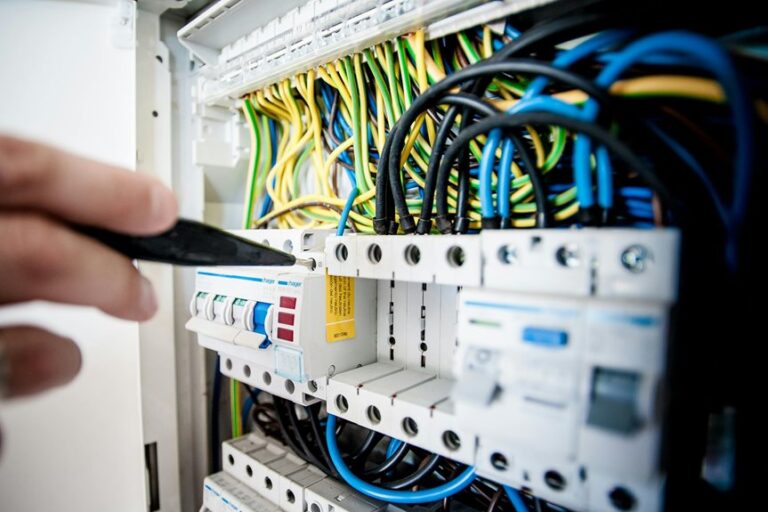If you've noticed flickering lights, frequent circuit breaker trips, or discolored outlets, it might be time to contemplate complete house rewiring. This process not only addresses safety concerns but also enhances energy efficiency and boosts property value. Understanding the signs that prompt such an upgrade is essential, as is knowing how the rewiring process unfolds. In addition, selecting the right electrician can greatly affect the overall experience and outcome. Knowing what to expect can guide your decisions, but there are critical factors to evaluate before you proceed.
Signs You Need Rewiring
If you've noticed flickering lights or frequently tripped circuit breakers, it might be time to contemplate rewiring your home. These signs often indicate that your electrical system is overloaded or malfunctioning.
Furthermore, if you hear buzzing sounds from outlets or notice discolored switches and sockets, these can signal faulty wiring or a potential short circuit.
Another critical sign is the presence of two-pronged outlets in a home built after the 1960s. Modern homes should have three-pronged outlets for safety reasons. If your home's wiring is outdated, it may not support today's electrical demands, leading to safety hazards.
Additionally, regular circuit breaker trips can point to an overloaded system. If you find yourself frequently resetting breakers, it suggests that your electrical circuits can't handle the load.
Finally, if you've experienced any electrical shocks when using appliances, that's a serious red flag. This could indicate faulty wiring or improper grounding, both of which require immediate attention.
Recognizing these signs early can prevent further complications and guarantee your home's electrical safety. Always consult a licensed electrician to assess your situation accurately. Expert electricians in Rancho Cucamonga can help ensure your home is up to code and safe for use.
Benefits of Complete Rewiring
Complete rewiring of your home can greatly enhance both safety and efficiency. By replacing outdated wiring, you reduce the risk of electrical fires caused by faulty or overloaded circuits. Modern wiring standards are designed to handle today's power demands, guaranteeing your home can safely accommodate all your devices and appliances without risk.
Furthermore, complete rewiring improves energy efficiency. New wiring can support energy-efficient lighting and appliances, which can lower your electricity bills over time. You'll benefit from enhanced performance, as new circuits minimize voltage drops and guarantee that your devices receive consistent power.
Another significant advantage is increased property value. A home with updated electrical systems becomes more attractive to potential buyers, as they'll appreciate the safety and reliability of modern wiring. Additionally, a complete rewiring project allows you to customize your electrical layout, providing the opportunity to incorporate smart home technology and additional outlets as needed.
Moreover, hiring experienced electricians ensures that the rewiring is done correctly and complies with local codes. Complete rewiring enhances your peace of mind. Knowing that your home's electrical system is up-to-date and reliable allows you to focus on what matters most without worrying about potential hazards. This investment in your home pays off in safety, efficiency, and long-term value.
The Rewiring Process Explained
Updating your home's electrical system is a significant undertaking, but understanding the rewiring process can make it more manageable.
The rewiring process typically begins with a thorough assessment of your current electrical system. An electrician will evaluate your existing wiring, outlets, and fixtures to identify any safety hazards or code violations.
Next, you'll collaborate with the electrician to design a new layout that meets your needs. This plan may include the number and placement of outlets, switches, and lighting fixtures.
Once the plan is finalized, the electrician will obtain the necessary permits to guarantee compliance with local building codes.
The actual rewiring involves removing outdated wiring and installing new circuits. This may require accessing walls and ceilings, so expect some disruption.
As the work progresses, the electrician will connect the new wiring to your electrical panel, making sure it can handle the increased load.
After installation, a series of inspections will be conducted to verify compliance with safety standards.
Finally, the electrician will test the system to confirm everything operates correctly. Additionally, finding a qualified electrician in Riverside can ensure that the job is done safely and efficiently.
Choosing the Right Electrician
Finding the right electrician is essential to ensuring a successful rewiring project. Start by verifying their qualifications. You should look for a licensed and insured electrician, as this indicates they've met the necessary industry standards and can cover any potential liabilities.
Check for certifications that demonstrate specialized training in residential wiring.
Next, assess their experience. An electrician with extensive rewiring experience will likely be more adept at managing challenges that arise during the project. Ask for references or reviews from previous clients to gauge their reliability and quality of work.
It's also important to discuss their approach to safety and compliance. A good electrician will adhere to local codes and regulations, ensuring the rewiring meets all safety standards.
Don't hesitate to ask about their process for obtaining necessary permits. Additionally, consider hiring Expert Electricians You Can Trust to ensure top-notch service and peace of mind.
Finally, communication is key. Choose someone who listens to your concerns and explains the process in a way you understand. This will facilitate a smoother working relationship throughout the project.
Cost Considerations for Rewiring
When considering the cost of rewiring your home, it's important to account for various factors that can influence the overall price. The complexity of your home's layout, the materials used, and local labor rates all play significant roles. Additionally, unexpected issues like outdated electrical systems or code violations can add to the expense.
Here's a breakdown of common cost factors:
| Factor | Estimated Cost Range | Notes |
|---|---|---|
| Materials (wiring, outlets) | $1,500 – $3,000 | Quality of materials affects durability. |
| Labor | $40 – $100 per hour | Rates vary by region and electrician experience. |
| Permits | $100 – $500 | Required for compliance with local codes. |
| Additional Repairs | $500 – $2,000 | May include drywall or structural repairs. |
Conclusion
In summary, complete house rewiring isn't just about upgrading old systems; it's about ensuring your home's safety and efficiency. With clear signs like flickering lights and tripped breakers, it's essential to take action. Investing in this process not only enhances your property's value but prepares it for future electrical demands. So, can you really afford to ignore the warning signs when your family's safety is at stake? Prioritize rewiring for a worry-free environment.








